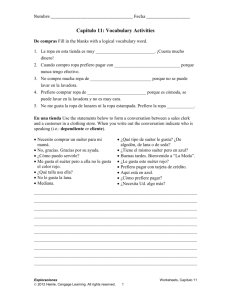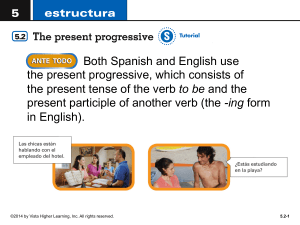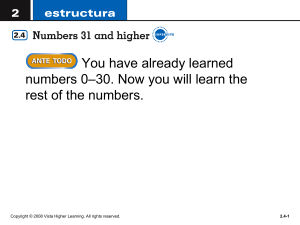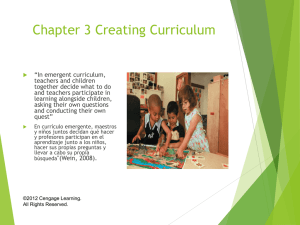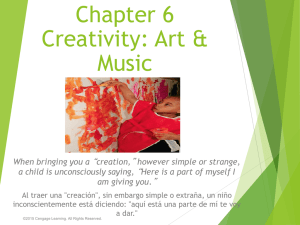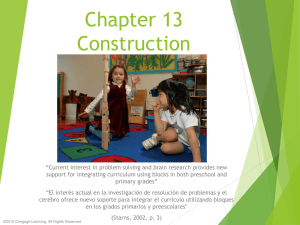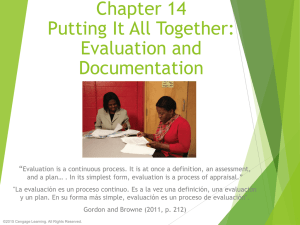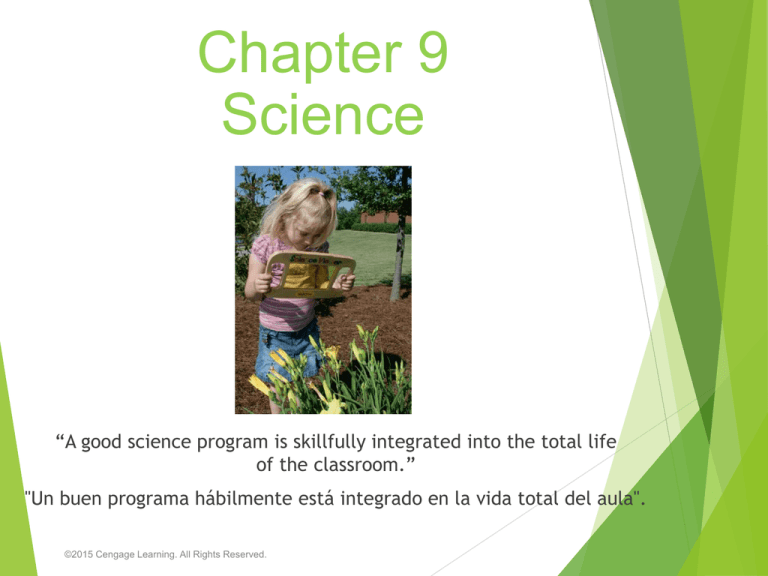
Chapter 9
Science
“A good science program is skillfully integrated into the total life
of the classroom.”
"Un buen programa hábilmente está integrado en la vida total del aula".
©2015 Cengage Learning. All Rights Reserved.
Basic Scientific
Process/Inquiry Skills
Process/Inquiry Skills (habilidades de
investigación/proceso)
Are based on concrete experiences
Se
basan en experiencias concretas
Opposite of rote learning
Opuesto
Support curiosity and exploration
Soporte
al aprendizaje de memoria
curiosidad y exploración
Child-directed and child-centered
Dirigida
por niño y centrado en el niño
©2015 Cengage Learning. All Rights Reserved.
Basic Scientific
Process/Inquiry Skills
Inquiry is thought of as a questioning process
Consulta
es considerado como un proceso de
cuestionamiento
Full inquiry involves asking a simple question,
completing an investigation, answering the
question, and presenting the results to others
Consulta
completa implica una pregunta sencilla,
completando una investigación, respondiendo a la
pregunta y presentar los resultados a los demás
©2015 Cengage Learning. All Rights Reserved.
Process Skill Terminology
Observation at the core of doing science
Observación en la base de hacer ciencia
Investigation skills (Habilidades de
investigación)
Comparing (Comparar)
Classifying (Clasificar)
Measuring (Medir)
Communicating (Comunicar)
Inferring (Inferir)
Predicting (Predecir)
Recording (registrar)
©2015 Cengage Learning. All Rights Reserved.
Children Learn Science
Concepts in a Social Setting
Work with others in learning
centers, cooperative
groups, and paired
activities
Engage in projects
Participar en los proyectos
Exchange of ideas
Trabajar con otros en
centros, grupos
cooperativos y
emparejadas las
actividades de aprendizaje
Intercambiar ideas
Discuss findings
Discutir las conclusiones
©2015 Cengage Learning. All Rights Reserved.
7 Content (Concepts) of
Science Based on NRC
1.
Science as inquiry
1.
Ciencia como investigación
Offers frequent opportunities
for children to question,
investigate, classify, predict,
and communicate
2.
Ofrece oportunidades
frecuentes para los niños
cuestionar, investigar,
clasificar, predecir y
comunicar
Life science (Censa de la vida)
People
Plants
Animals
Personas, plantas, animales
©2015 Cengage Learning. All Rights Reserved.
7 Content (Concepts) of
Science Based on NRC
3.
4.
Physical science (Ciencia física)
Physics (física)
Chemistry (química)
Earth and space science (ciencia de la tierra y el
espacio)
Geology (geología)
Meteorology (meteorología)
Astronomy (astronomía)
©2015 Cengage Learning. All Rights Reserved.
7 Content (Concepts) of
Science Based on NRC
5.
Science in personal and
social perspectives
(Ciencia en
perspectivas personales
y sociales)
Children develop an
understanding of
health, changes in
environments, and
ways to conserve and
recycle
©2015 Cengage Learning. All Rights Reserved.
7 Content (Concepts) of
Science Based on NRC
Los
niños desarrollan
un entendimiento de
la salud, cambios en
los entornos y formas
de conservar y
reciclar
6.
Ecology (Ecología)
Relationship between
living things and their
environment
Relación entre los seres
vivos y su entorno
©2015 Cengage Learning. All Rights Reserved.
7 Content (Concepts) of
Science Based on NRC
7.
Science and technology
(ciencia y tecnología)
Establishing connections
between natural and
man-made items
Establecer conexiones
entre los elementos
naturales y artificiales
Simple tools invite handson investigations of how
technical objects operate
Herramientas simples
invitación práctica
investigaciones de
objetos técnicos cómo
operar
©2015 Cengage Learning. All Rights Reserved.
Methods of Discovery
Open-ended
opportunities
Investigations
Self-discovery
Problem solve
Hands-on
Explore
Discover
Verify
Record
©2015 Cengage Learning. All Rights Reserved.
Methods of Discovery
Oportunidades
abiertas
investigaciones
auto-descubrimiento
Solucionar
problemas
prácticas
explorar
descubrir
verificar
Record
©2015 Cengage Learning. All Rights Reserved.
Critical Thinking and
Problem Solving
Remember children think in concrete terms
and learn in the context of playing
Build on what children already know
Recuerda los niños pensar en términos
concretos y aprenden en el contexto del juego
Construir sobre lo que ya saben los niños
Emphasize sensory awareness, explore
manipulate, question, discover, and use
other process skills
Acentuar la conciencia sensorial, explorar
manipular, cuestionar, descubrir y utilizar
otras habilidades de proceso
©2015 Cengage Learning. All Rights Reserved.
Critical Thinking and
Problem Solving
Take advantage of the children’s world as
you introduce new materials
Enable them to revisit their work so they can
reflect and expand on ideas
Tomar ventaja del mundo de los niños como se
introducen nuevos materiales
Permitirles revisar su trabajo para que puedan
reflejar y expandir ideas
Give children TIME
Dale TIEMPO a los niños
©2015 Cengage Learning. All Rights Reserved.
Creating a Scientific
Environment
Preparation of the environment is critical
Preparación del medio ambiente es
fundamental
Must allow for active engagement in the
process of learning
Debe
permitir la participación activa en el
proceso de aprendizaje
Must encourage investigations
Debe
alentar las investigaciones
©2015 Cengage Learning. All Rights Reserved.
Creating a Scientific
Environment
Schedule must be flexible in order to take
advantage of teachable moments
horario
debe ser flexible para aprovechar
momentos de enseñanza
©2015 Cengage Learning. All Rights Reserved.
Suggested Science
Materials and Equipment
Recycled, donated, purchased
Use with safety in mind
Reciclados, donados, comprados
Utilizar con seguridad en mente
Age-appropriate (Edad apropiada)
This is critical (Esto es critico)
Be cautious (Se cauteloso(a))
Extended activities: TIME is required
Extendió las actividades: se requiere tiempo
©2015 Cengage Learning. All Rights Reserved.
Suggested Science
Materials and Equipment
Las investigaciones toman tiempo para
evolucionar
Some investigations are unpredictable but
learning still occurs
Algunas investigaciones son impredecibles pero
aprendiendo todavía ocurre
©2015 Cengage Learning. All Rights Reserved.
Possible Inquiry Topics
Investigate water
Investigar agua
Discover rainbows
Descubrir arcoíris
Explore shadows
Explorar las sombras
Grow grass
Crece hierba
Focus on nature
Enfoque a la
naturaleza
Air
Nature walks
Gardens
©2015 Cengage Learning. All Rights Reserved.
Aire
Caminatas de
naturaleza
Jardines
Ecology
Plant and garden all year long
Make a compost pile
Captura y recicla el agua de lluvia
Adopt or plant a tree
Hacer una pila de compost
Catch and recycle rainwater
Planta y jardín a lo largo del año
Adoptar o plantar un árbol
Recycle and conserve materials
Reciclar y conservar los materiales
©2015 Cengage Learning. All Rights Reserved.
Ecology
Use grocery sacks and newspapers at the easels
Stress the importance of not littering
Recalcar la importancia de no tirar basura
Celebrate Earth Day
Utilizar bolsas de comestibles y periódicos a los
caballetes
Celebra el día de la tierra
Read special nature books
Leer libros de naturaleza especial
©2015 Cengage Learning. All Rights Reserved.
Animals in Early Childhood
Education
Animals in our world (Animales en nuestro mundo)
Touchable versus untouchable
Que
se puede tocar y que no
Rescue procedures (procedimiento de rescate)
Emergency care (cuidado de emergencia)
Animals in our classroom (Animales en nuestro salón de
clases)
Food and housing (comida y casa)
Care and maintenance (cuidado y mantenimiento)
©2015 Cengage Learning. All Rights Reserved.
Nutrition
Introducing nutrition concepts at an early
age can influence a lifetime of food choices
and balances
Introducción de conceptos de nutrición a una edad temprana
puede influir en una vida de opciones alimenticias y saldos
©2015 Cengage Learning. All Rights Reserved.
Nutrition
Nutrition is the study of food and how it is
used by the body
La nutrición es el estudio de los alimentos y
cómo es utilizado por el cuerpo
Nutrients are substances found in foods that
provide for the growth, development,
maintenance, and repair of the body
Los
nutrientes son sustancias que se
encuentran en los alimentos que proveen para
el crecimiento, desarrollo, mantenimiento y
reparación del cuerpo
©2015 Cengage Learning. All Rights Reserved.
Nutrition
Children should be exposed to and
encouraged to accept a variety of foods
from each of the food groups suggested by
the U.S. Department of Agriculture (USDA)
My Plate Guide
Los niños deben ser expuestos a y animó a
aceptar una variedad de alimentos de cada
uno de los grupos de alimentos sugeridos por
el Departamento estadounidense de
Agricultura (USDA) mi placa guía
©2015 Cengage Learning. All Rights Reserved.
Cooking
By including opportunities for children to
cook, you offer times for them to practice
Incluyendo las oportunidades para los niños a
cocinar, ofrecen plazos para su práctica
Math (Matemáticas)
Comparing
sizes, shapes, and measurements;
fractions; and temperature
Comparación de tamaños, formas y medidas;
fracciones; y la temperatura
Science (Ciencia)
Vegetables
that are stems or roots, fruit that
grows on trees
Vegetales que son tallos o raíces, fruto que
crece en los árboles
©2015 Cengage Learning. All Rights Reserved.
Cooking
Reading and writing (Leer y escribir)
Making
lists and using recipes and rebus charts
Hacer listas y el uso de recetas y cartas de
rebús
Social studies (Estudios sociales)
Learning
more about their world and
community resources
Aprender más sobre los recursos del mundo y la
comunidad
©2015 Cengage Learning. All Rights Reserved.
Diversity in Science
Read books to the children, display
objects and artifacts from different
cultures, show photographs, and explore
websites of faraway places
Leer libros a los niños, los objetos de
visualización y artefactos de diferentes
culturas, mostrar fotografías y explorar
páginas web de lugares lejanos
Provide them with digital or disposable
cameras to take photographs that
illustrate the diversity in what they see
Proveerles con cámaras digitales o
desechables para tomar fotografías que
©2015 Cengage Learning. All Rights Reserved.
ilustran la diversidad de lo que ven
Diversity in Science
Foods from other cultures offer
opportunities for children to taste
different ingredients and flavors
Comidas de otras culturas ofrecen
oportunidades a los niños a probar sabores
e ingredientes diferentes
©2015 Cengage Learning. All Rights Reserved.
Supporting Each and
Every Child’s Success
When cooking, watch for food allergies
Cuando se cocina, cuidado para las alergias
alimentarias
Children with tactile hypersensitivity may need
to be introduced to different new foods or
textures slowly
Los
niños con hipersensibilidad táctil pueden
necesitar ser introducido a diferentes nuevos
alimentos o texturas lentamente
Messy play materials may need to be contained
to minimize the sensation
Materiales
de juego sucio pueden necesitar ser
contenido para minimizar la sensación
©2015 Cengage Learning. All Rights Reserved.
Supporting Each and
Every Child’s Success
Rebus recipes with pictures and words and
sequence charts or cards with picture icons
can be a helpful cueing device to complete
the steps in a science experiment and offer
opportunities to practice following directions
and motor planning
Rebús recetas con palabras, imágenes y
gráficos de secuencia o tarjetas con iconos de
imagen pueden ser un dispositivo de
localización útil para completar los pasos de un
experimento científico y ofrecen oportunidades
de practicar siguiendo las indicaciones y
planificación de motor
©2015 Cengage Learning. All Rights Reserved.
Supporting Each and
Every Child’s Success
Larger tools such as a baster instead of an eye
dropper may help some children be more
successful
Herramientas más grandes tales como un
rociador en lugar de un gotero puede ayudar a
algunos niños ser más exitosos
Presenting science materials contained on
trays may help some children who get
overwhelmed with clutter
Presentación de ciencia de materiales
contenida en las bandejas puede ayudar a
algunos niños que reciben abrumados con el
desorden
©2015 Cengage Learning. All Rights Reserved.
Encouraging Family Support
Help them understand their children are
natural scientists
Share ideas both general and specific
Ayudarles a entender que sus hijos son
científicos naturales
Compartir ideas generales y específicas
Help them to realize that science is all
around in daily living
Ayudarlos a darse cuenta de que la ciencia es
todo en la vida cotidiana
Ideas to involve families (Ideas para involucrar
a las familias)
©2015 Cengage Learning. All Rights Reserved.
Tips for Teachers
Science is a way of thinking
La ciencia es una forma de pensar
Provide developmentally appropriate
activities
Proporcionar actividades apropiadas
“Do with” not “tell about”
"Hacer
con" no "contado"
Learn alongside the children
Aprender junto a los niños
©2015 Cengage Learning. All Rights Reserved.
Tips for Teachers
Provide appropriate multicultural activities
Proporcionar adecuadas actividades
multiculturales
Assess children’s progress through listening
and recording observations
Evaluar el progreso de los niños a través de
escuchar y grabar las observaciones
©2015 Cengage Learning. All Rights Reserved.

